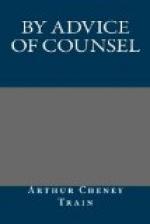“He—er—may not have wished Mr. Tutt to know about it,” murmured Payson, dropping his eyes.
“Oh,—hardly!” protested Tutt. “We can be morally certain that this letter was written and placed with the will that time your father came in here and asked to be allowed to see it, seven odd years ago. Mr. Tutt would have noticed it if your father had placed it with the will in the first instance and would have warned him that nothing of the sort could possibly be effective.”
“But,” insisted Payson, “assuming for argument’s sake that this letter was in fact written at the time the will was originally executed, what is the reason the law won’t recognize it as a valid bequest?”
Tutt smiled and fumbled in an open box for another cigarette.
“My dear sir,” he replied, “no paper could possibly be treated as part of a will—even if extant at the time the will was executed—unless distinctly referred to in the will itself. In a word, there must be a clear and unmistakable intention on the part of the testator to attempt to incorporate the extraneous paper by reference. Now, here, there is no reference to the paper in the will at all.”
“That is true!” admitted Payson. “But—”
“But even if there were,” went on Tutt, eagerly, “the law is settled in this state that where a testator—either through carelessness or a desire to economize space or effort, has referred in his will to extraneous papers or memoranda, either as fixing the names of beneficiaries of particular devises or bequests, or as fixing the amount or the manner in which the amount of such devises or bequests is to be ascertained, such a paper must not contain any testamentary disposition of property. In a word the testator having willed something can identify it by means of an extraneous paper if properly designated, but he cannot will the thing away by an extraneous paper no matter how referred to. For example, if A wills to B ’all the stock covered by my agreement of May 1, with X’ it merely describes and identifies the thing bequeathed,—and that is all right. The law will give effect to the identifying agreement, although it is separate from the will and unattested. But, if A’s will read ’and I give such further bequests as appear in a paper filed herewith’ and the paper contained a bequest to B of ‘all the stock covered by my agreement of May 1, with X’ it would be an attempted bequest outside of the will and so have no legal effect.”
“Thanks,” said Payson. “I understand. So in no event whatever could this letter have any legal effect?”
“Absolutely none whatever!—You’re perfectly safe!” And Tutt leaned back with a comfortable smile.
But Payson did not smile in return. Neither was he comfortable. Be it said for him that, however many kinds of a fool he may have been, while momentarily relieved at knowing that he had no legal obligation to carry out his father’s wishes so far as Sadie Burch was concerned, his conscience was by no means easy and he had not liked at all the tone in which the paunchy little lawyer had used the phrase “you’re perfectly safe.”




